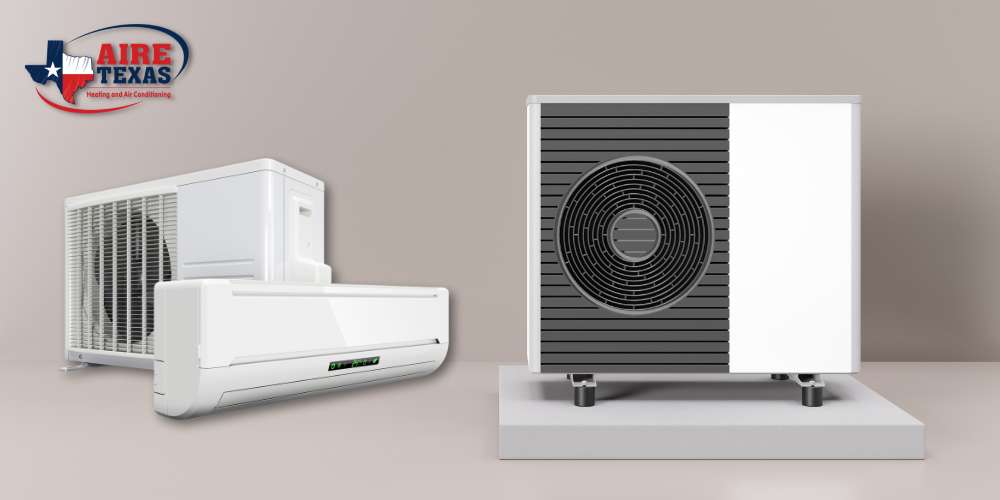Choosing the right HVAC system for your home can significantly impact your comfort and energy bills. The choice between heat pump vs mini-split systems is more than just a preference; it’s a decision that can impact your living space and financial well-being. Both options offer unique benefits, but understanding the differences is key to making an informed decision.
Heat pumps provide comprehensive heating and cooling power for the entire house, often leveraging existing ductwork. On the other hand, ductless mini-split systems offer flexibility and targeted climate control without the need for ducts, making them ideal for specific living spaces.
Ready to transform your home’s comfort and efficiency? The North Texas heating and air professionals at Aire Texas are here to guide you through this important decision. Whether you’re considering a traditional air conditioner, a versatile heat pump, or a state-of-the-art mini-split system, our team has the knowledge and experience to help you choose the perfect solution.
Contact Aire Texas at (972) 734-1791 today to explore your options and take the first step towards a more comfortable and energy-efficient living space.
What is a Heat Pump?
A heat pump is a versatile HVAC system that can both heat and cool your home. Unlike traditional heating and cooling systems that generate heat or cool air, heat pumps transfer heat and cool air, making them more energy-efficient and environmentally friendly.
Heat pumps are typically ducted, though there are ductless heat pumps, too. Both ductless and ducted heat pump systems utilize this efficient heat transfer process to provide cooled air in the summer and warm air in the winter. This method enhances the heat pump’s efficiency, allowing you to significantly reduce your energy consumption and save on your utility bills.
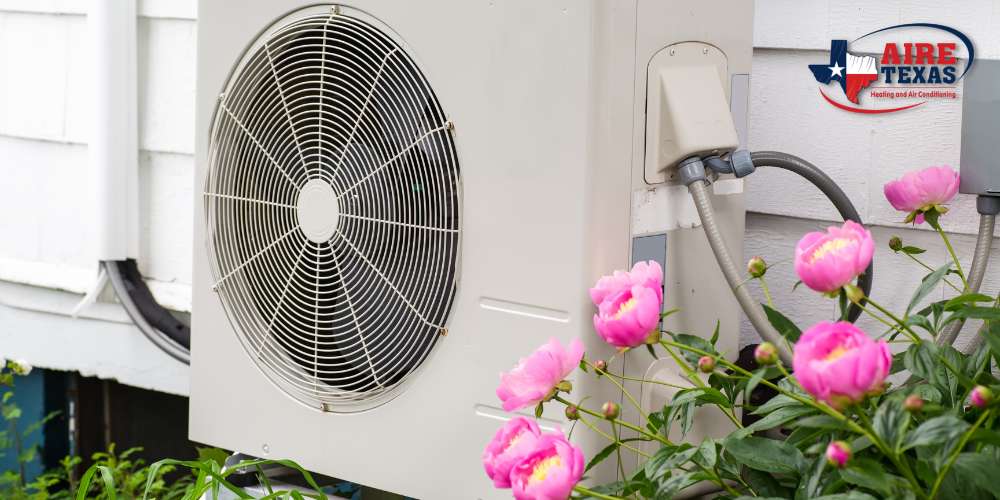
Types of Heat Pumps
There are three main types of heat pumps: air-source, ground-source, and water-source heat pumps. Below, our Dallas heat pump service technicians cover each of these types.
Air-Source Heat Pumps
Air-source heat pumps are the most common type. They transfer heat between your home and the outside air. These systems are popular because they are relatively easy to install and work well in various climates, including here in the DFW area. An air source heat pump can efficiently heat and cool your home throughout the year, utilizing the outdoor air as a stable heat source.
Ground-Source Heat Pumps
Also known as geothermal heat pumps, ground-source heat pumps transfer heat between your home and the ground. They are highly efficient and can provide stable heating and cooling, but they often require significant installation effort and cost. Ground-source heat pumps are excellent for maintaining maximum efficiency, even in extreme weather conditions. These systems can also be paired with a backup heating system in colder climates to provide consistent warmth during the most frigid temperatures.
Water-Source Heat Pumps
Water-source heat pumps use water as their heat transfer medium. They are less common but can be very efficient in areas with a stable water source. These systems offer a great cooling solution by transferring heat to and from bodies of water like lakes or rivers.
How Do Heat Pumps Work?
Heat pumps work by transferring heat from one place to another using a refrigerant cycle. During the summer, they extract heat from your home and release it outside, cooling your home. In the winter, they reverse the process, extracting heat from the outside air (or ground/water) and bringing it inside to warm your home. The refrigerant absorbs and releases heat as it cycles through the system.
A typical heat pump system consists of an outdoor unit and an indoor unit. The outdoor unit extracts heat from the air or ground and transfers it to the indoor unit, distributing warm air throughout your home. This heat transfer process makes heat pumps much more energy-efficient than traditional HVAC systems. Unlike a traditional furnace, which burns natural gas or uses electric resistance to generate heat, a heat pump moves heat, resulting in lower electrical bills and increased efficiency.
Heat pumps can be part of a duct system, distributing heated or cooled air throughout the home using air ducts. This setup is similar to that of traditional air conditioners and gas furnaces. There are also ductless heat pumps for those seeking a heating and cooling solution without the use of ductwork.
Heat pumps can operate efficiently during freezing temperatures, although they may be supplemented with a backup heating system to maintain comfort. By using a heat pump instead of a traditional furnace alone, homeowners can enjoy consistent heating and cooling while reducing their reliance on natural gas and lowering their energy consumption.
What is a Mini Split?
Mini split systems are another type of HVAC system that can heat and cool your home, which is why they may also be referred to as ductless heat pumps. They consist of just one outdoor unit and one or more indoor units connected by refrigerant lines. A mini split heat pump is ideal for homes without existing ductwork and offers flexible installation options.
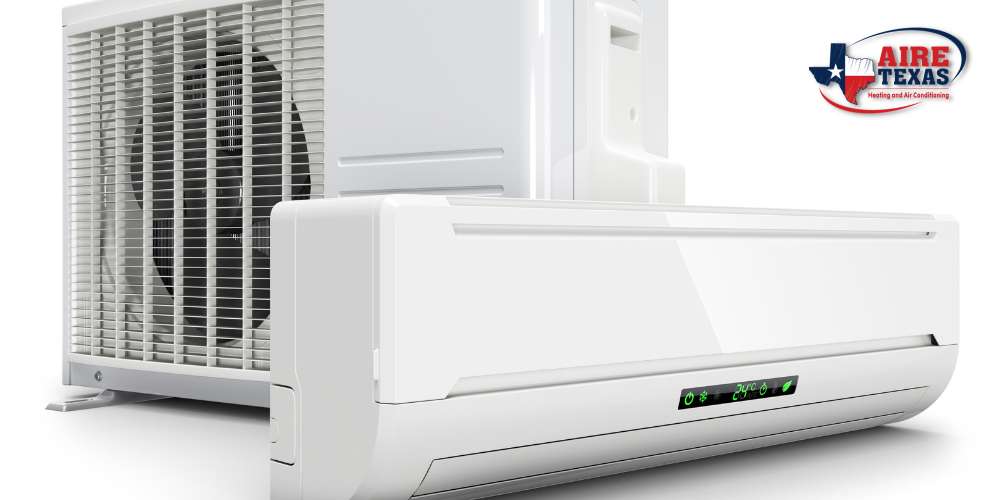
Types of Mini Splits
There are two main types of mini splits our Dallas mini split installation specialists work with. These include single-zone and multi-zone systems.
Single-Zone Mini Split Systems
Single-zone mini splits have one outdoor unit connected to one indoor unit via a refrigerant line. They are ideal for heating and cooling individual rooms or small areas. This type of system allows for precise temperature control in specific areas, enhancing comfort and energy efficiency.
Multi-Zone Mini Split Systems
Multi-zone mini splits have one outdoor unit connected to multiple indoor units, also via refrigerant lines. This lets you heat and cool multiple rooms or zones independently, providing greater flexibility and control. Multi-zone systems are perfect for larger homes or buildings with varying heating and cooling needs in different zones.
How Does a Mini Split Work?
Mini-splits work similarly to heat pumps by transferring heat using a refrigerant cycle. The outdoor unit extracts or releases heat, while the indoor units distribute cooled or warmed air to specific areas of your home. This system is highly efficient because it eliminates the need for ductwork, which can cause energy losses in traditional HVAC systems.
Do Mini Splits Heat and Cool?
Yes, mini splits can both heat and cool your home, making them a versatile solution for year-round comfort. They operate efficiently in both modes, providing consistent and reliable temperature control throughout the year.
Comparing Heat Pumps and Mini Splits
When comparing heat pumps and mini splits, it’s important to consider some key aspects. This includes their installation and space requirements, efficiency, costs, and overall flexibility and control.
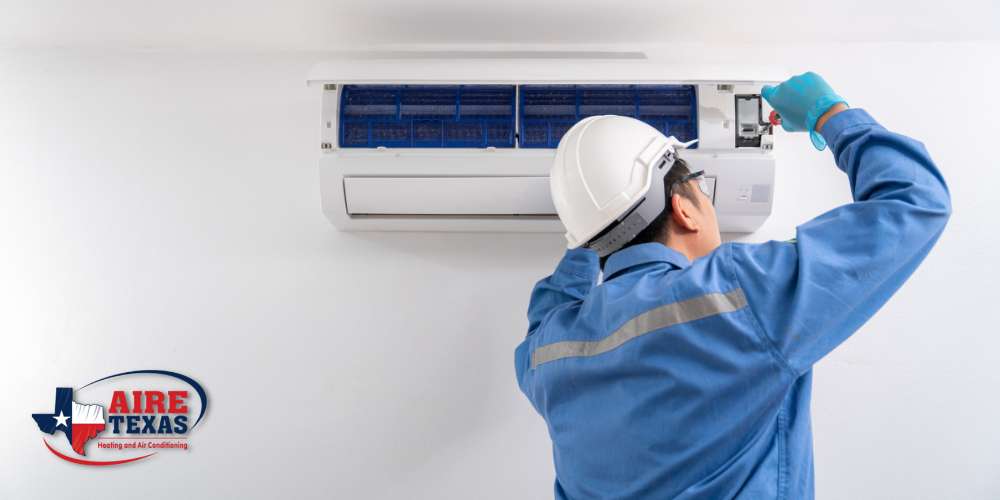
Heat Pump vs. Mini Split Installation
Heat pumps can be installed as ducted or ductless systems. Ducted heat pumps use existing ductwork to distribute air, while ductless systems use individual units. Heat pump installation involves setting up the outdoor unit and connecting it to the indoor units. This process can be more complex and costly if ductwork needs to be added or modified.
Mini-splits are always ductless, making installation simpler. The outdoor unit connects to indoor units via refrigerant lines, reducing installation time and cost. Due to their ductless nature, mini-splits typically have lower installation costs and shorter installation times. The lack of ducts also means there are fewer opportunities for energy loss, enhancing the system’s efficiency.
Heat Pump vs. Mini Split Efficiency and Performance
Heat pumps have high Seasonal Energy Efficiency Ratio (SEER) and Heating Seasonal Performance Factor (HSPF) ratings, indicating their efficiency in cooling and heating. Heat pumps use less energy by transferring heat rather than generating it, which can lead to significant energy savings. However, heat pumps will not operate during power outages, so it’s important to have a backup heating system in place for uninterrupted comfort.
Mini-splits also have excellent SEER ratings and are known for their efficiency, often outperforming traditional HVAC systems in terms of energy consumption. The ability to control the temperature in individual zones further enhances their energy efficiency, allowing you to heat or cool only the areas you are using. Like heat pumps, mini splits will also be affected by power outages, so considering additional backup solutions can be beneficial.
Heat Pump vs. Mini Split Costs
Heat pumps tend to have higher initial costs, especially for ducted systems. However, they provide long-term savings through energy efficiency. The initial purchase and installation costs for heat pumps can vary depending on the type and complexity of the system.
Due to their ductless design, mini-splits often have lower upfront costs and installation expenses. This design simplifies installation and reduces labor costs. Both systems are energy-efficient, leading to lower utility bills. However, an added benefit to mini-splits is that with fewer components, it can lower maintenance costs, reducing long-term operating costs overall.
Heat Pump vs. Mini Split Flexibility and Control
Mini-splits excel in zoning, allowing individual control of different areas. This flexibility enhances comfort and energy savings. You can adjust the temperature in specific rooms or zones, ensuring you only use energy where needed.
Both systems support remote control and smart home integration, providing convenient and precise control over your home’s temperature. Plus, with modern HVAC systems, you can use smart thermostats and mobile apps to manage your heating and cooling settings from anywhere, ensuring maximum efficiency and comfort.
Heat Pump vs. Mini Split Space and Aesthetics
Mini-splits have compact outdoor units and small indoor units that can be mounted on walls or ceilings, minimizing space usage. This makes them an excellent choice for homes with limited space or specific aesthetic requirements.
Heat pumps require space for the outdoor unit and, if ducted, sufficient room for ductwork. However, they can be integrated into existing ductwork for minimal visual impact. The choice between the two systems often comes down to your home’s specific layout and space constraints.
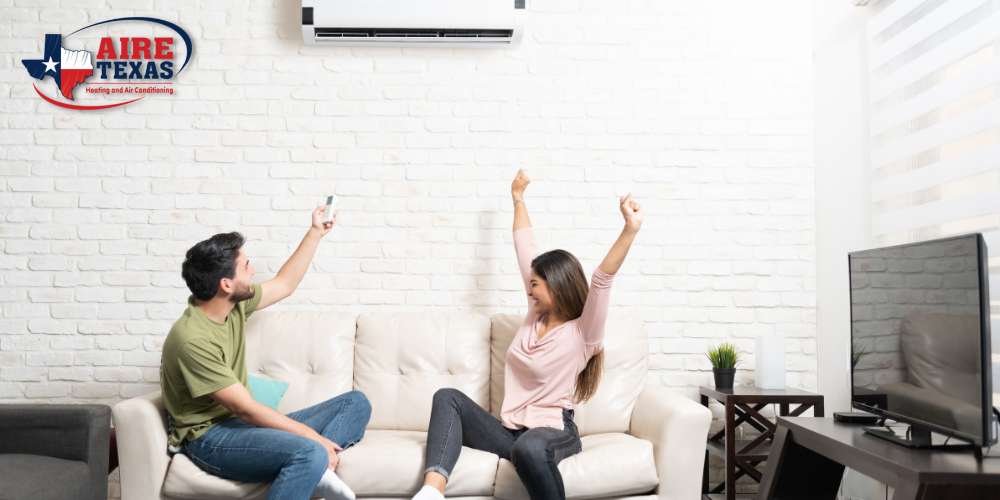
Which System is Right for You?
In summary, the best way to determine which system is right for you is to consider these important factors:
- Home size and layout: Consider the size and layout of your home. Mini-splits are ideal for zoned heating and cooling in homes with diverse temperature needs. If you have a larger home with multiple rooms that require individual temperature control, a multi-zone mini-split system may be the best option. This can lead to lower electric bills, as you only heat or cool the areas you are using.
- Climate: Heat pumps are particularly effective in regions with moderate climates, while mini splits offer reliable performance in both heating and cooling modes, maintaining comfort and efficiency throughout the year. Plano’s climate is suitable for both systems, as air-source heat pumps and mini-splits perform well in mild winters and hot summers.
- Budget: Evaluate your budget for initial costs, installation, and long-term savings. Mini-splits may offer lower upfront costs and installation expenses. Both systems provide energy savings that can offset the initial investment over time. Consider potential savings on electric bills when choosing between these systems.
- Personal preferences and lifestyle needs: Also consider your preferences for temperature control, aesthetic impact, and zoning capabilities. Mini splits provide flexible, individualized comfort. If you prefer a system that allows for precise control of different areas of your home, a mini-split system might be the better choice. Both a heat pump and mini splits can enhance your home’s comfort while optimizing energy efficiency.
Call Aire Texas Today for Personalized Advice and Professional Installation
For expert advice, professional installation, and reliable heat pump and mini split system repair in Dallas, TX, contact Aire Texas by calling (972) 734-1791. Our team is here to help you find the perfect heating and cooling solution for your home. Whether you’re looking for a ducted heat pump system, a ductless mini split system, or need advice on all energy-efficient HVAC solutions, Aire Texas has you covered. We’re here to help with comparing heat pump vs mini-split systems to determine the best fit for your needs.

